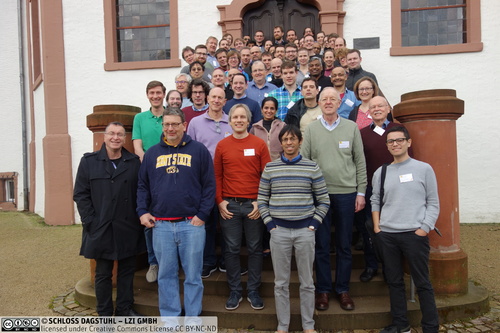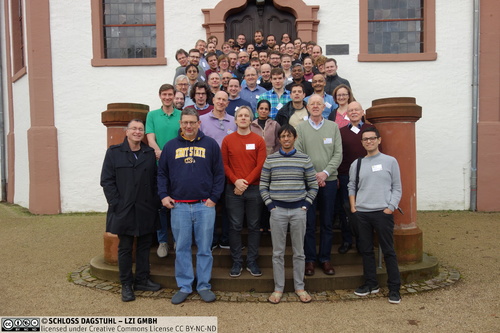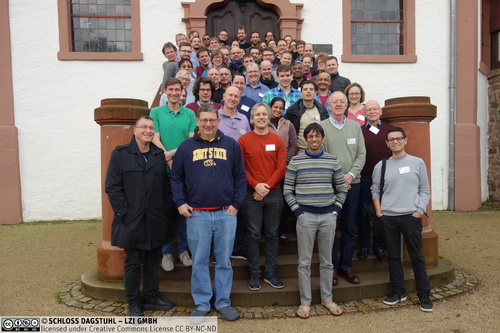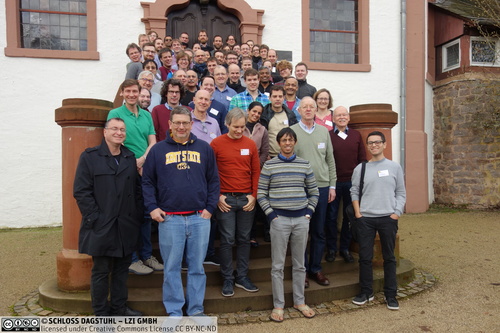Dagstuhl Seminar 20081
Scheduling
( Feb 16 – Feb 21, 2020 )
Permalink
Organizers
- Nicole Megow (Universität Bremen, DE)
- David Shmoys (Cornell University - Ithaca, US)
- Ola Svensson (EPFL - Lausanne, CH)
Contact
- Andreas Dolzmann (for scientific matters)
- Annette Beyer (for administrative matters)
Schedule
Scheduling is a major research field that is studied from a practical and theoretical perspective in computer science, mathematical optimization, and operations research. Applications range from traditional production scheduling and project planning to the newly arising resource management tasks in the advent of internet technology and shared resources. Despite the remarkable progress on algorithmic theory for fundamental scheduling problems, new questions gain greater prominence due to the rise of new applications.
This Dagstuhl Seminar will focus on the interplay between scheduling problems and problems that arise in the management of transportation and traffic. There are several notable aspects of the scheduling problems that arise particularly in this context:
- the role of dynamic decision-making in which data-driven approaches emerge (especially those that have stochastic elements in modeling the multi-stage decision-making);
- the interplay between scheduling aspects and what might be viewed as routing aspects, providing a spacial component to the nature of the scheduling problem;
- the tension between questions of coordination and competition that arise from the fact that for many of the issues in this domain, there are significant questions that depend on the extent to which the traffic can be centrally coordinated.
Since the community working on the intersection of scheduling and traffic is itself rather broad, we methodologically focus on the theoretical design of algorithms, mathematical optimization methods, and the interplay between optimization and game-theoretic approaches.
 Nicole Megow, David Shmoys, and Ola Svensson
Nicole Megow, David Shmoys, and Ola Svensson
This seminar was the sixth in a series of Dagstuhl "Scheduling" seminars (since 2008). Scheduling is a major research field that is studied from a practical and theoretical perspective in computer science, mathematical optimization, and operations research. Applications range from traditional production scheduling and project planning to the newly arising resource management tasks in the advent of internet technology and shared resources.
This edition of the seminar focused on the interplay between scheduling problems and problems that arise in the management of traffic. There are several notable aspects of the scheduling problems that arise particularly in this context:
- the role of dynamic decision-making in which data-driven approaches emerge (especially those that have stochastic elements in modelling multi-stage decision-making);
- the interplay between scheduling aspects and what might be viewed as routing aspects, providing a spacial component to the nature of the scheduling problem;
- the tension between questions of coordination and competition that arise from the fact that, for many of the issues in this domain, there are significant questions that depend on the extent to which the traffic can be centrally coordinated.
Since the community working on the intersection of scheduling and traffic is itself rather broad, the seminar focused on researchers whose methodological focus relies on tools from the theoretical design of algorithms, on mathematical optimization methods, and on the combination of optimization and game-theoretic approaches.
Organization of the Seminar. The workshop brought together $59$ researchers from theoretical computer science, mathematical optimization and operations research. The participants consisted of both senior and junior researchers, including a number of postdocs and advanced PhD students.
During the five days of the workshop, 31 talks of different lengths took place. Four keynote speakers gave an overview of the state-of-the art of the respective area in 60 minutes:
- Shuchi Chawla: Mechanisms for resource allocation
- Benjamin Moseley: Combinatorial Optimization Augmented with Machine Learning
- Éva Tardos: Learning in Games and in Queueing Systems
- Vera Traub: Approximation algorithms for traveling salesman problems.
The remaining slots were filled with shorter talks of $30$ minutes on various topics related to scheduling, routing, transportation, mechanism design, learning, and applications in practice. Another highlight of the workshop was a historical note given by Jan Karel Lenstra with his view on the dynamic development of the area of scheduling in the past 60 years. Further, in the beginning of the week, open problem sessions were held. Throughout the week, a few sessions with spotlight talks of $8$ minutes gave participants the chance to announce recent results and invite for discussions. The schedule left ample free time that was actively used for fruitful discussions and joint research.
Outcome. Organizers and participants regard the workshop as a great success. The workshop achieved the goal to bring together the related communities, share the state-of-the art research and discuss the current major challenges. The talks were excellent and very stimulating; participants actively met in working groups in the afternoon and evenings. It was remarked very positively that a significant number of younger researchers (postdocs and PhD students) participated and integrated very well.
The organizers wish to express their gratitude towards the Scientific Directorate and the administration of the Dagstuhl Center for their great support for this workshop.
 Nicole Megow, David Shmoys, and Ola Svensson
Nicole Megow, David Shmoys, and Ola Svensson
- Antonios Antoniadis (MPI für Informatik - Saarbrücken, DE) [dblp]
- Yossi Azar (Tel Aviv University, IL) [dblp]
- Etienne Bamas (EPFL - Lausanne, CH) [dblp]
- Sanjoy Baruah (Washington University, US) [dblp]
- Shuchi Chawla (University of Wisconsin - Madison, US) [dblp]
- Christian Coester (CWI - Amsterdam, NL) [dblp]
- Sami Davies (University of Washington - Seattle, US) [dblp]
- Christoph Dürr (Sorbonne University - Paris, FR) [dblp]
- Franziska Eberle (Universität Bremen, DE) [dblp]
- Thomas Erlebach (University of Leicester, GB) [dblp]
- Naveen Garg (Indian Institute of Technology - New Dehli, IN) [dblp]
- Tobias Harks (Universität Augsburg, DE) [dblp]
- Ruben Hoeksma (University of Twente - Enschede, NL) [dblp]
- Sungjin Im (University of California - Merced, US) [dblp]
- Sven Jäger (TU Berlin, DE)
- Xinrui Jia (EPFL - Lausanne, CH)
- Thomas Kesselheim (Universität Bonn, DE) [dblp]
- Samir Khuller (Northwestern University - Evanston, US) [dblp]
- Max Klimm (HU Berlin, DE) [dblp]
- Peter Kling (Universität Hamburg, DE)
- Amit Kumar (Indian Institute of Technology - New Dehli, IN) [dblp]
- Marilena Leichter (TU München, DE)
- Jan Karel Lenstra (CWI - Amsterdam, NL)
- Alberto Marchetti-Spaccamela (Sapienza University of Rome, IT) [dblp]
- Sebastien Martin (LYFT - New York, US)
- Jannik Matuschke (KU Leuven, BE) [dblp]
- Nicole Megow (Universität Bremen, DE) [dblp]
- Rolf H. Möhring (TU Berlin, DE) [dblp]
- Sarah Morell (TU Berlin, DE)
- Benjamin J. Moseley (Carnegie Mellon University - Pittsburgh, US) [dblp]
- Kamesh Munagala (Duke University - Durham, US) [dblp]
- Viswanath Nagarajan (University of Michigan - Ann Arbor, US) [dblp]
- Seffi Naor (Technion - Haifa, IL) [dblp]
- Neil Olver (London School of Economics and Political Science, GB) [dblp]
- Britta Peis (RWTH Aachen, DE) [dblp]
- Kirk Pruhs (University of Pittsburgh, US) [dblp]
- Jens Quedenfeld (TU München, DE)
- Shijin Rajakrishnan (Cornell University - Ithaca, US)
- Lars Rohwedder (EPFL - Lausanne, CH) [dblp]
- Thomas Rothvoss (University of Washington - Seattle, US) [dblp]
- Guido Schäfer (CWI - Amsterdam, NL) [dblp]
- Kevin Schewior (Universität Köln, DE) [dblp]
- Jiri Sgall (Charles University - Prague, CZ) [dblp]
- David Shmoys (Cornell University - Ithaca, US) [dblp]
- Bertrand Simon (Universität Bremen, DE)
- René Sitters (VU University of Amsterdam, NL) [dblp]
- Martin Skutella (TU Berlin, DE) [dblp]
- Clifford Stein (Columbia University, US) [dblp]
- Leen Stougie (CWI - Amsterdam, NL) [dblp]
- Ola Svensson (EPFL - Lausanne, CH) [dblp]
- Éva Tardos (Cornell University - Ithaca, US) [dblp]
- Vera Traub (Universität Bonn, DE) [dblp]
- Marc Uetz (University of Twente - Enschede, NL) [dblp]
- Rob van Stee (Universität Siegen, DE) [dblp]
- Laura Vargas Koch (RWTH Aachen, DE) [dblp]
- Victor Verdugo (London School of Economics, GB)
- Jose Verschae (O'Higgins University - Rancagua, CL) [dblp]
- Tjark Vredeveld (Maastricht University, NL) [dblp]
- Andreas Wiese (University of Chile, CL) [dblp]
Related Seminars
- Dagstuhl Seminar 08071: Scheduling (2008-02-10 - 2008-02-15) (Details)
- Dagstuhl Seminar 10071: Scheduling (2010-02-14 - 2010-02-19) (Details)
- Dagstuhl Seminar 13111: Scheduling (2013-03-10 - 2013-03-15) (Details)
- Dagstuhl Seminar 16081: Scheduling (2016-02-21 - 2016-02-26) (Details)
- Dagstuhl Seminar 18101: Scheduling (2018-03-04 - 2018-03-09) (Details)
- Dagstuhl Seminar 23061: Scheduling (2023-02-05 - 2023-02-10) (Details)
- Dagstuhl Seminar 25121: Scheduling (2025-03-16 - 2025-03-21) (Details)
Classification
- optimization / scheduling
Keywords
- scheduling
- traffic
- routing
- approximation algorithms
- mechanism design





 Creative Commons BY 3.0 DE
Creative Commons BY 3.0 DE
